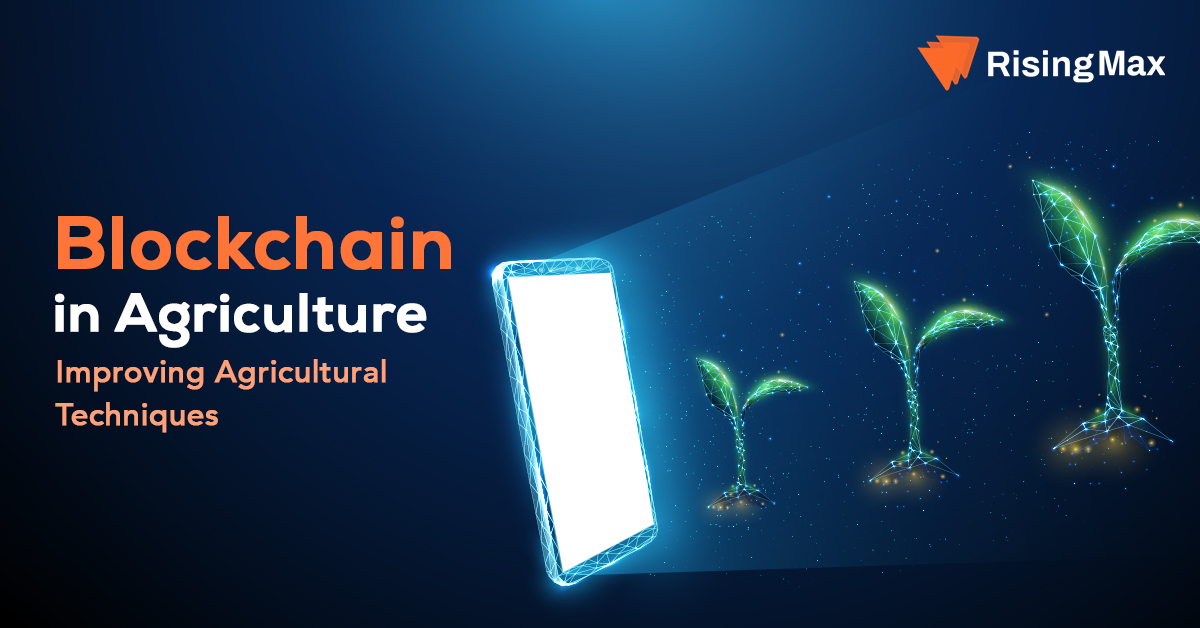Restructuring Agriculture Industry With The Applications Of Blockchain

Blockchain is the advanced development in the IT field that is revolutionizing other fields globally. It is a fact that the global blockchain industry will rise to USD 394.60 billion by the year 2028. The blockchain applications are fully explored with a great impact, and their potential is supremely good in the agriculture field also.
Agriculture is the most essential industry worldwide, as it contributes USD 992 billion to the GDP of the United States only. In this digital era, food producers face many issues in the field of farming and they need to be fully empowered. There is a limited trust and connectivity with almost no transparency solutions among the food system partners.

Discuss How Our Technology Can Help Your Agriculture & Supply Chain
Let us explore how blockchain combined with IoT can facilitate farmers and other stakeholders in making optimum decisions.
These days, people want to know where their food is coming from, and whether it's healthy or not. The emerging need for healthy and fresh food requires a technology that can improve food safety, quality, and the traceability of the farming supply chain.
Is there any solution for this? Yes, Blockchain technology agriculture.

But, What Is Blockchain Technology For Agriculture?
Blockchain technology is a distributed ledger technology to record and authenticate transactions or events info securely. In Blockchain technology, there is no central authority to maintain any records and transactions of the users, which was part of the traditional data system. Instead, users can only access all the transactions on the blockchain platform.
This advanced technology provides the trust value for any industry that needs these important layers for the business. It enables secure & timeless storing and accessing of data while providing integrity, interoperability, and interconnectivity.
Blockchain-based technologies provide authenticity to the farmers and the agriculture industry to ensure efficiency, trust, and transparency. Blockchain for farmers secures data from tampering and claims; from the cultivation & harvesting process to the storage and transportation.
Blockchain in farming allows food producers to cooperate optimally and enhance coordination that helps to develop sustainable and biodiversity-friendly agriculture. Transparency in the agri-food supply chain provides technical knowledge and business skills to the food producers and retailers to generate greater income on their crops and products.
Why Is Blockchain Important For Modern Businesses?
Restructuring Food Supply From Farm to the Plate
If you ever get a chance to visit the farm, you'll get to know about the farmer's complicated ecosystems, seasonal financing, exact timing requirements, and a lot of moving machines. After the food is dispatched from the farm to the market, it becomes a part of a huge supply chain; chasing the dinner table by passing through many hands and processes.
- Who guarantees quality? How reliable is the procedure of quality assurance?
- Other than what you can see and smell, how else can you determine the quality of the food on your plate?
- How can the food quality be determined prior to consumption?
Somewhere in our minds, these questions arise and we all need the answers for the same.
The application of blockchain in agriculture is the most advanced use case of blockchain technology to make the process of supplying food more simple and reliable. Blockchain technology helps the agriculture sector in lowering transaction costs, optimizing logistics, increasing traceability, and enhancing food safety.
Blockchain Technology Applications In Agriculture
There are many blockchain applications in the field of agriculture, and many of the apps are being developed in this innovative technology. We'll break down the applications into four major segments and discuss the same.
- Smart Farming
- Food Supply Chain
- Agriculture Insurance
- Agriculture Products Transactions
On Explaining,
Smart Farming
Smart farming, also known as smart agriculture, is the practice of merging technological breakthroughs into the farming process in order to improve efficiency and reliability. Information and communication technology (ICT), the internet of things (IoT), numerous sensors, machine learning technologies, and a variety of data collection and analysis tools, such as unmanned aerial vehicles, are all part of it.
Although blockchain farming technology has been available to farmers for some time, building a robust and comprehensive security system in order to successfully handle and exploit the data generated is a major challenge in its implementation.
Food Supply Chain
Because of the rise of globalization, the food supply chain in agriculture has become more intense than it has ever been. Some of the challenges in the usual food supply chain are the unease of food safety, quality, trust, and inefficient supply chain. This not only affects the economy and society but also keeps the high-risk of the consumers.
By allowing building trust between farmers and customers, blockchain technology in farming aids in the resolution of many of these issues. By including precise product information on the blockchain, this process may be made much more transparent.
Agriculture Insurance
In recent decades, climate change has made the entire agricultural process more unstable. Weather extremes have an impact on both crop and cattle quality. Most farmers believe agricultural insurance schemes to be the best option for coping with the volatility of farming.
Farmers pay a modest insurance charge at the start of each cropping cycle and are eligible for a payout if their farms suffer losses owing to weather irregularities. This provides farmers with some breathing room as they deal with the uncertainty brought on by weather variations.
Agriculture Products Transactions
The procurement and sale of agricultural products on ecommerce sites can be significantly accelerated with the usage of blockchain technology. This portion benefits from it in two ways:
- Information protection
- Management of the supply chain
Blockchain offers the essential feature of private key encryption, which increases the validity of the authentication process. This can help ensure that all data collected throughout the planting and harvesting phases is used safely and securely.
Blockchain reduces the cost of signaling for all parties involved, resulting in increased overall efficiency.
Opportunities Of Blockchain Technology In The Agriculture Field
Many sectors including finance, manufacturing, and government sectors use blockchain-based transactions. The agricultural sector also uses these transactions in supply chains, land registrations, and creating digital IDs.
Traceable & Auditable
The agriculture sector's biggest difficulty is figuring out how to track and pay for product deliveries. These days, the distribution process is coordinated by a third party. Buyers normally have an agent who recommends payment and audits the delivery, whereas sellers usually have an agent who guarantees that the products are delivered securely. The use of many agents increases the system's costs and lengthens the process.
The entire procedure can be reduced to a single distributed ledger using blockchain technology. Farmers can sell crops or food directly to the market without the use of intermediaries thanks to features like traceability and auditability.
Logistics & Payments
In today's agricultural and blockchain supply chain, logistics is a major concern for almost every medium to large farm enterprise. We're dealing with large quantities of perishable goods in strange situations with a lot of money on the line at this stage.
Deliveries can be greatly simplified by incorporating blockchain into logistics. Yes, farmers will be free from long chains of intermediaries because of smart contracts. And, of course, they'll be able to relax knowing that the goods will arrive in good condition to the final user.
Food Production
Smart farming allows IoT devices to collect crucial data like soil temperature, water level, fertilizer details, and more and transfer it to the blockchain. Smart contracts can activate and execute particular actions based on data stored in the blockchain. It will aid in improving the quality of both the farming operation and the products produced.
Use of Blockchain technology in food industry
IoT & Quality Control
It's never been easy to keep track of the quality of crops (from harvest to distribution). It is, in essence, a massive issue for farmers and growers all over the world. However, the good news is that blockchain technology can be used to solve this problem. Farmers can easily survey soil quality, irrigation, and pests in a precise and efficient manner with IoT solutions.
It's also worth noting that there are efforts underway to use sensors to monitor the condition of stored crops over time. The foremost objective of blockchain technologies is to automate everything related to record-keeping.
Data Security
The issue of data security remains unanswered. Cryptographic hashing is another element of blockchain that permits data subjects to better supervise and control who has access to their (personal) data. Smart contracts, especially when cryptocurrencies are used, conduct money transfers without the need for an intermediary.
Without a doubt, the technology is still in its early stages of development, and user acceptance is modest due to the (now) higher convenience of centralized systems. However, blockchain has the potential to drastically cut transaction costs and the requirement for regulatory intervention.
Use Cases Of Blockchain For Cybersecurity
Benefits Of Blockchain Application In Agriculture
Based on the various opportunities and applications of blockchain technology in Agriculture mentioned above, there are many perks of blockchain in the field of agriculture. We'll discuss some major benefits of Blockchain in Farming & agriculture.
Food Quality & Safety
Blockchain helps us with the supply chain's increased transparency by removing ineffective processes. Let us take an example of crop failure because of unfavorable climate conditions globally. Farmers across the world face these problems on a daily basis. To solve this issue, farmers can make use of IoT devices to allow farmers to monitor all the factors that can affect their crops.
Supply Chain Traceability
Many users want to know about the food standards and from where their food is coming. Blockchain technology comes up with the full-and-final solution of letting users know the place of their food origin, who grew it, and how fresh it is. It will reduce food fraud, false labeling, fair pay for producers, and letting consumers know what they're paying for.
Improved Farmer’s Productivity
The traditional technology that most farmers are using is a combination of multiple apps, spreadsheets, and notes to manage their farming process and record the data. However, it requires a very long time period to send this data further. Blockchain technology allows farmers to store their data in a single place to make it easy to access for those who want to check it. This will simplify the entire process and save time and energy.
Fair Payment Process For Farmers
One of the main issues that farmers face is not receiving the full payment of the goods on time. Also, the wire transfers in the traditional mechanisms often charge a significant chunk of the farmer's earnings. Blockchain technology works with the advanced payments models to automatically trigger payments in actual time without charging excessive fees.
Some other benefits of blockchain technology for farmers are:
- Throughout the value chain, there is traceability.
- Small-scale farming financing and insurance
- Financial transaction facilitation in emerging economies
- Fair pricing across the entire value chain
- Emissions reductions and financial support for green initiatives
- Consumer awareness and satisfaction are on the rise.
- Purchase decisions made by consumers who are more informed
- Reduced transaction fees and less reliance on intermediary services for a more sustainable business and waste reduction
- Transparency in transactions and the absence of fraud
- Product quality has improved, and there are fewer disorders linked to food.
- Regulations require data accessible while safeguarding privacy.
How Will Blockchain Impact The Financial Industry
Stay Updated With Latest Blockchain Technology
What’s further for Agriculture?
Blockchain provides advanced platforms to provide transparency in food chain supply. Blockchain advancements provide the full potential to its platform to change the face of the farming and agriculture industry. With the advancement in technology, there will be a great improvement in the reliability and efficiency of blockchain applications for agriculture.
RisingMax offers you the latest info about the new advancements in blockchain and agriculture technology. We provide updated information and keep you up to date with the new market trends. Choose us as the final destination of your search to learn more about agriculture and supply chain development.
Reach our Blockchain experts or schedule a call to discuss your idea in detail and get a better understanding of blockchain technology applications in the agriculture industry.
















